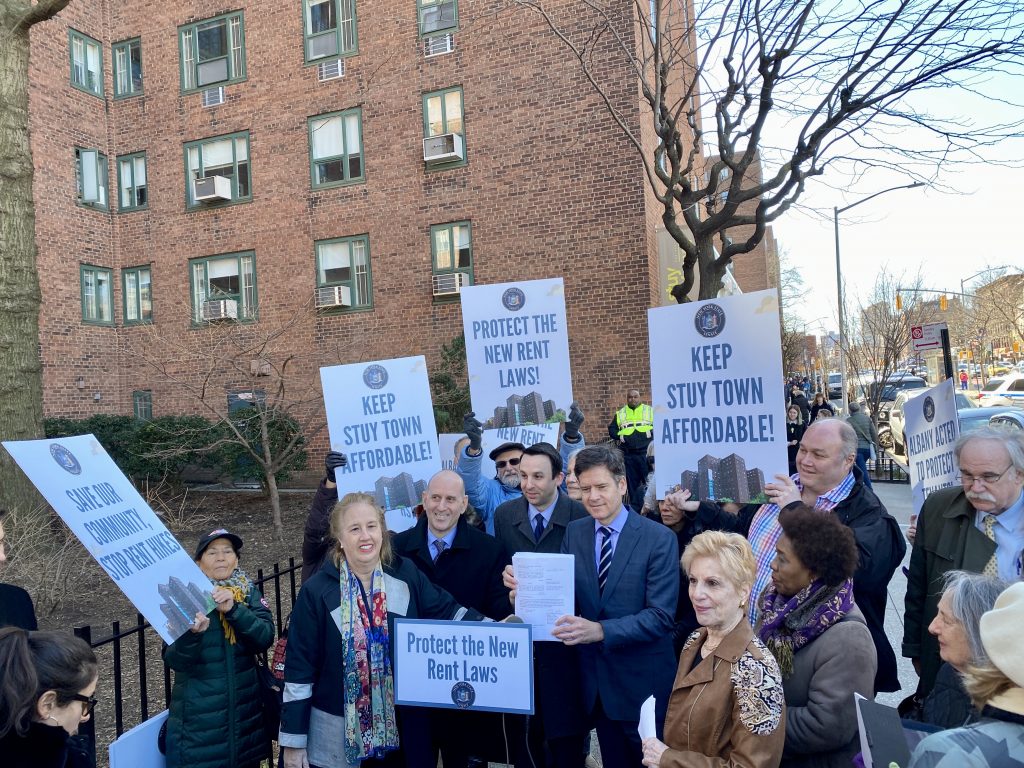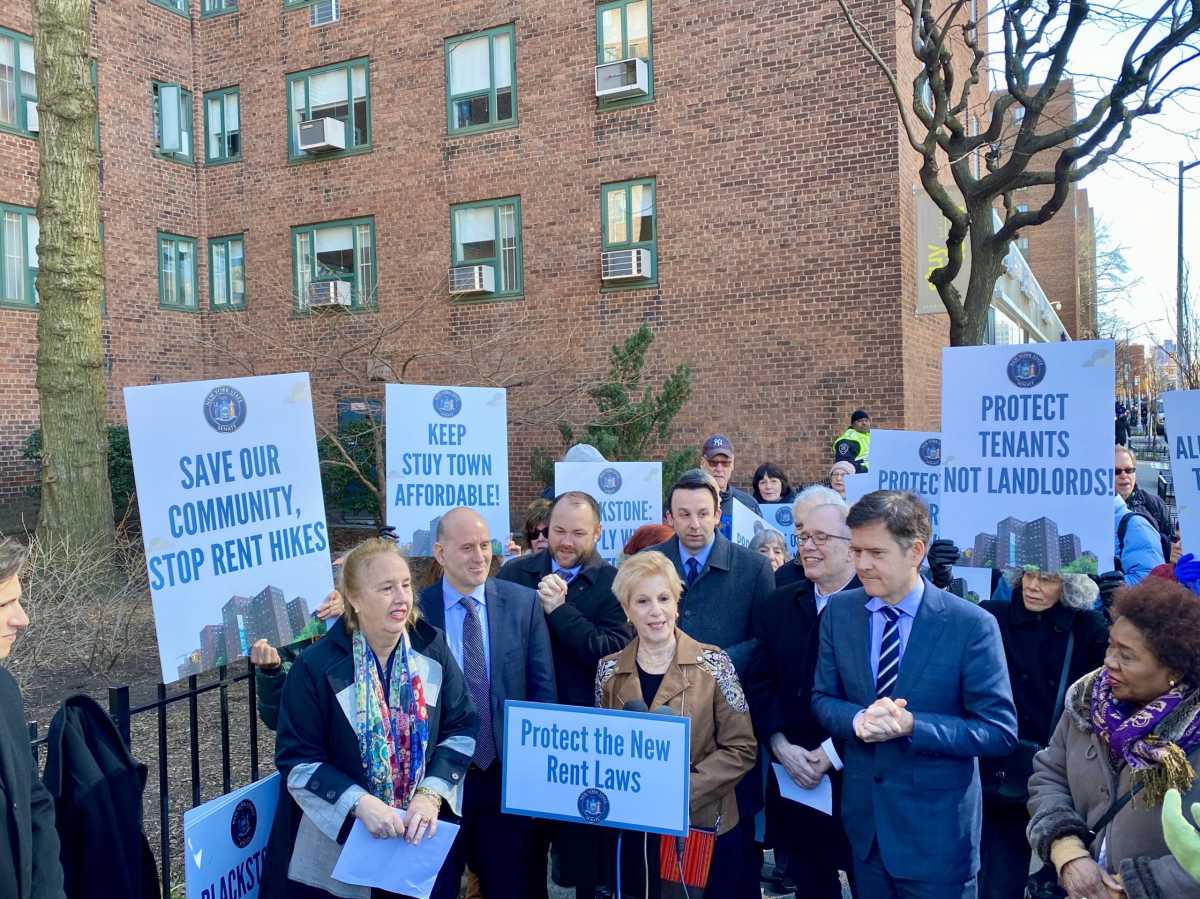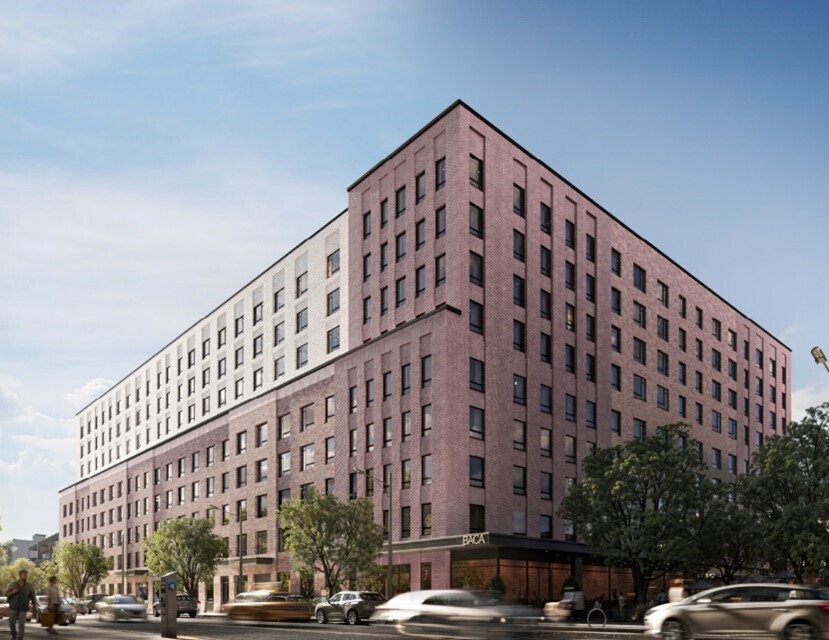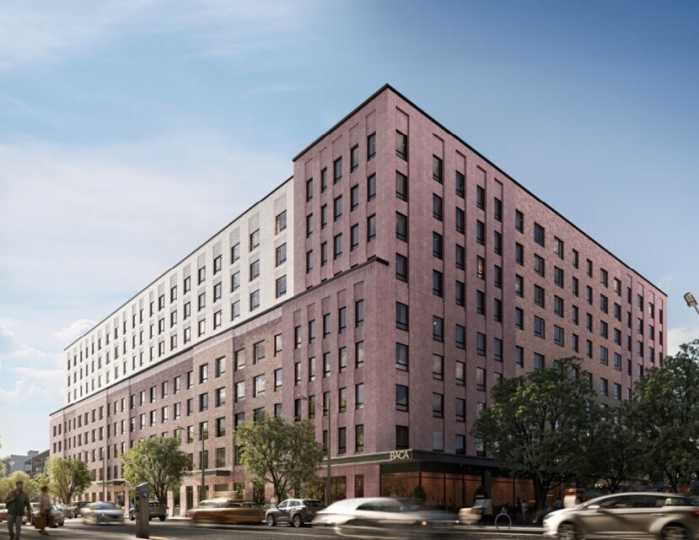Facing possible deregulation of some apartments this summer at Stuyvesant Town-Peter Cooper Village, the complex’s Tenants Association filed a legal action in New York State Supreme Court to request legal protection of the apartments under last year’s tenant protections legislation passed by New York State.
The 2009 Roberts v. Tishman Speyer court case ruled that apartments had been illegally deregulated and must be re-regulated because owners were receiving J-51 tax benefits, which are designated for owners of rent-regulated buildings.
That case’s settlement stated that apartments would no longer be subject to rent regulation when the J-51 benefits ran out, marking June 2020 for when the rent regulation would end.
When Blackstone acquired the complex in 2015, it made an agreement with the city to keep 5,000 units affordable. The agreement also included subclasses of units, including the “Designated Roberts Units,” the recent filing noted, said to be open to deregulation on or after July 1, 2020, with a 5 percent rent increase cap on some of those units for five years. Another group of apartments in the 2015 agreement was “Market Units,” the March 5 filing said, which had no rent or income restrictions and “may be subject to Rent Stabilization, as applicable.”
The Tenants Association filing states about these two groups of apartments, “Over the next two years, leases are expected to end for at least several hundred tenant households falling within these groups… their status as regulated tenants with renewal rights and rent guidelines protection (now at 1.5% for a one year renewal under NYC Rent Guidelines Board Order #51) will or may be challenged by the Defendant-Owners.”
The filing says the New York State Housing Stability and Tenant Protection Act of 2019 should be applied to the units and override previous rulings related to J-51 and deregulation, but that there has been no indication that this will happen, and “this presents the possibility of widespread litigation with a multiplicity of suits along with a potential for conflicting judicial determinations.
“Given the sizable and potentially harsh consequence,” the document continues, “on families and individuals faced with the possibility of losing rent and lease renewal protections under the rent stabilization laws, Plaintiffs respectfully come to this Court for a declaration of their legal status.”
When Blackstone was asked for comment, a spokesperson said, “We welcome the Court’s involvement, but to be clear, no tenant subject to the J-51 program has seen an increase in rents above those legally allowed under rent stabilization. We are confident that the Court will reaffirm the 2012 Roberts settlement, which explicitly stated that these J-51 units should no longer be subject to rent regulation as of June 2020.
“We could not be prouder of what we have done for the residents of Stuy Town. We voluntarily restricted 5,000 Stuy Town apartments as affordable, spent hundreds of millions of dollars in capital improvements across the property, and massively improved service levels—doubling resident satisfaction since our ownership.”
Blackstone added that it will keep the 5,000 apartments affordable that were agreed upon in 2015, with average rents of $1,800 monthly. Concerning the 6,200 units that would be affected by the Roberts case, average income is $262,000, Blackstone said, and the units are above the decontrol threshold but remain regulated solely because of the current J-51 tax benefit, though they are currently near market rate at about $4,000 monthly.
The Tenants Association filing states that the 2019 tenants protection legislation repealed high rent/high income deregulation, “and units subject to stabilization on June 14, 2019 remain subject to rent stabilization regardless of future vacancies or high rent/high income status.”
Blackstone announced that while the motion is being considered by the New York State Supreme Court, rents will not be raised on any renewal lease above citywide rent stabilized apartment increases, as set by the Rent Guidelines Board.
The Blackstone spokesperson said the company was committed to transparency and that for Stuyvesant Town residents affected by the deregulation after June 2020, riders have been sent to them since 2012 along with their leases, to give notice about the upcoming change.
Susan Steinberg, President of the Stuyveant Town-Peter Cooper Village Tenants Association, said at a March 5 press conference at Stuyvesant Town that when Blackstone took over, they pledged to provide affordability. “Five years ago the future looked rosy,” she said. “Now we are again in a situation of uncertainty.”
Steinberg thanked the elected officials at the event, including Council Member Keith Powers, Council Speaker Corey Johnson, State Senator Brad Hoylman, Manhattan Borough President Gale Brewer, City Comptroller Scott Stringer, NYC Public Advocate Jumaane Williams, Assembly Member Harvey Epstein and a representative on behalf of U.S. Representative Carolyn Maloney.

“The new law is clear and unambiguous,” Steinberg said. “The Tenants Association saw no other avenue than to file a motion to get clarity with the law.”
Steven Newmark, a J-51 tenant who is one of the plaintiffs in the court filing, said, “My family and I are tired of the constant uncertainty about our housing situation.”
Newmark, who has lived in Stuyvesant Town for 13 years, said he felt stability for the first time after the 2019 protections were passed, but called it “unfair” and “punitive” to still have to fight after that law’s passage.
“The anxiety my family feels is real,” Newmark said, adding he and his wife work for local nonprofits and their children go to local schools. “We want to continue to live here and see this community thrive.”
Council Member Powers said he lived in Stuyvesant Town, where three generations of his family have lived, and he said the neighborhood was built to be affordable.
“Many families have come here seeking the same opportunity,” Powers said. “We’re not just fighting for folks living here today but those ahead.” He also thanked Blackstone for its commitment to not increase rents above stabilization rates until a legal ruling is made.
“We’re a bit nervous here,” said Assembly Member Epstein. He said that when the 2019 tenant protection legislation was being drafted in Albany, the issue of not being able to deregulate J-51 apartments was specifically addressed, which is an issue that affects tens of thousands of units across the city. “That’s what we did in 2019,” he said, “ensure families across our city and state to stay in their homes.”
State Senator Hoylman said that about 300,000 units in the city had been deregulated in the previous 25 years, which was aimed to be stopped with the 2019 law. “But the battle is clearly not over,” he said, adding about the 2019 law, “We stated there is no expiration date on rent stabilized housing.”
“We are united as a community,” Hoylman said, “to make sure we keep Stuy Town-Peter Cooper Village affordable.”
































